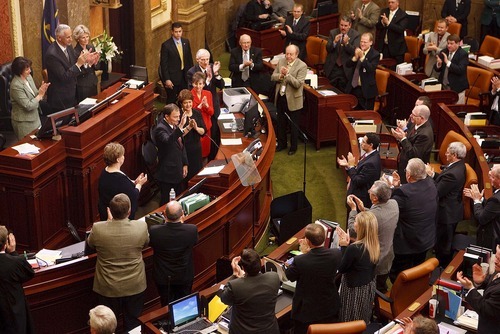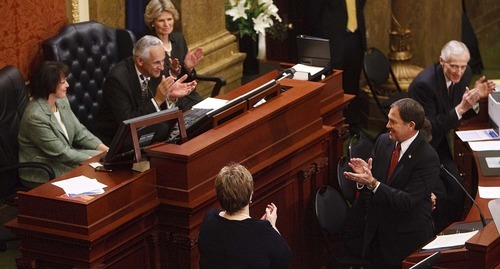This is an archived article that was published on sltrib.com in 2011, and information in the article may be outdated. It is provided only for personal research purposes and may not be reprinted.
Utah Gov. Gary Herbert vowed Wednesday to beat back federal encroachment on states' rights and drive vigorous energy development, including urging serious consideration of nuclear power plants in the state.
"I firmly believe if we, as a state, fail to vigorously fight to protect and defend our rights under the Constitution, those rights will invariably be seized and usurped by the federal government," Herbert said. "I remind Washington: We are a state, not a colony, and I assure you, on my watch Utah will not stand idly by."
Herbert said Utah would continue its fight against federal health reform that, Herbert argued, is an unconstitutional mandate. And, he said, the state would resist a decision by U.S. Interior Secretary Ken Salazar last month to reconsider whether 2.8 million acres of federal land in Utah should be off-limits to development and off-roading.
"This process and the resulting policy are flat-out wrong," Herbert insisted.
The governor's office has already announced its intent to file a lawsuit, claiming ownership of hundreds of roads that cross federal land. And legislation from Rep. Carl Wimmer, R-Herriman, would effectively disregard any federal land designation with which the state does not concur and require county sheriffs to open any closed-off areas.
"The fact is there's a land grab going on in our state, and the more we dig into this the more destructive it appears," said Senate Majority Leader Scott Jenkins. He said the state has no choice but to go to court and fight the feds over the land issues. "We've just got to do something."
Herbert also blamed Washington, D.C., for failing to do its job with regard to immigration and said "where the federal government has abdicated its responsibility and stepped aside, we must step forward."
Herbert said the state will find a solution to the problem, but urged a civil dialogue.
While the governor's rhetoric excited the overwhelmingly Republican majority, it received a lukewarm reception from Democrats, most of whom sat quietly during the governor's states' rights applause lines.
"It's not about states' rights, it's about what's right for the state," said House Minority Leader David Litvack, D-Salt Lake City.
The 25-minute speech revisited many of the governor's most familiar themes since he inherited the office in August 2009, when Gov. Jon Huntsman Jr. accepted the position as U.S. ambassador to China.
The governor said that Utah's economy is "on the road to recovery," and the state is on better budget footing than other states. He said unemployment claims are dropping and the state is focused on getting people back to work.
He urged the state to help make capital available to small, startup businesses, called for a focus on increasing global exports, and urged investment in rural Utah.
He also said the state has to develop its energy resources and said it is time for the state to look hard at nuclear power.
"The very foundation of Utah's energy will, most assuredly, be provided by either fossil or nuclear fuels. Every state has to face that simple reality, and more than 30 states have chosen to include nuclear power in their energy portfolio," Herbert said. "We must begin substantive debate and deliberation of whether there is a place for nuclear energy in Utah."
Ted Wilson, Herbert's environmental adviser, said the nuclear issue is included in the governor's energy initiative and the issue will be spearheaded by his new energy adviser, when one is appointed to replace the current vacancy. Any discussion of the nuclear issue, Wilson said, will rely heavily on the availability of water in the state.
One company, Transition Power Development, led by former state Rep. Aaron Tilton, has begun the process of obtaining a license from the U.S. Nuclear Regulatory Commission.
"That's our future," said Jenkins. "It's going to have to be nuclear if it's not fossil fuel."
In his first State of the State address after winning election to the state's top post, Herbert also insisted that funding education "must be our number one budget priority."
In the past two years, Utah schools absorbed 25,000 new students without additional funding. Next fall, another 14,700 students are expected to enroll, an all-time high.
Herbert has proposed $50 million to pay to educate those students — enough to fund most of them — but the Legislature is heading in the opposite direction, looking, at least initially, to cut 7 percent from the school budget.
Jenkins said ultimately he expects the Legislature to fund growth. "We have to fund the growth. We haven't for two years," he said. "We're trying to get rid of some of the garbage." —
Gary Herbert
The Republican has been governor since taking over the helm from Gov. Jon Huntsman Jr. in 2009. But this is his first State of the State address as Utah's top elected leader. He won last November's special election to fill out the remaining two years of Huntsman's term. Herbert faces re-election in 2012.





